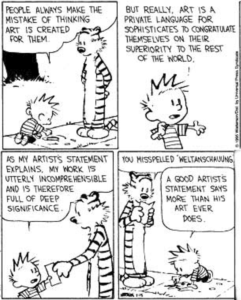 The artist’s statement is a fairly daunting document; how can one expect to full express the breadth, depth, and meaning of one’s art in less than one page? And at the same time, on the surface it seems like such a useless document because art (music) should speak for itself, right? Well, the artist’s statement is not quite as simple as that.
The artist’s statement is a fairly daunting document; how can one expect to full express the breadth, depth, and meaning of one’s art in less than one page? And at the same time, on the surface it seems like such a useless document because art (music) should speak for itself, right? Well, the artist’s statement is not quite as simple as that.
Two specific events in my own experience made me realize how important it is to write my own artist’s statement. The first was my very first graduate school interview in January. I tend to be an outwardly shy person, which comes across poorly in such “interrogation by faculty panel” affairs. When asked questions about my music and my background, my timidness came across as insecurity. But the kiss of death came from trying to explain my art without having previously taken the time to deeply think about and describe my influences, my aims, or my aspirations. Needless to say, that interview did not go well, and the rejection letter came within the week.
The second experience actually happened today: it was a masterclass with a guest composer at the University of Louisville’s New Music Festival. The lesson began with the same type of questions that came in my interview, and once again I found myself floundering in trying to answer. (I also made the mistake of showing older works with higher performance quality, but more conservative tonality and orchestration that didn’t best show myself off to a composer whose music is significantly more avant-garde than my own.) My lesson quickly turned into a lecture, which included a statement of confusion as to how I am in a graduate composition program–ouch! After drowning my sorrows in Chai Tea, I took a breath and thought about why the lesson went so poorly. And I realized it was because I was not able to give a clear, confident explanation of my work.
The artist’s statement gives the composer a chance to explain his or her music, but it also forces us to really think about our art in a focused way, and then to organize those thoughts. My former composition professor, Dr. Jennifer Jolley, wanted me to write an artist’s statement as a sort of final project for my undergraduate program, but with the myriad of projects in my last semester, I ended up not doing it. I know it took me a while to realize how beneficial the artist’s statement could be, but not everyone has to make that realization the way I did: by proverbially face-planting. So, I encourage all artists to start working on their artist’s statements; I know I am going to!